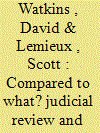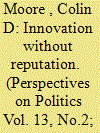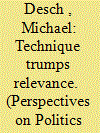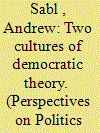|
|
|
Sort Order |
|
|
|
Items / Page
|
|
|
|
|
|
|
| Srl | Item |
| 1 |
ID:
140201


|
|
|
|
|
| Summary/Abstract |
Many democratic and jurisprudential theorists have too often uncritically accepted Alexander Bickel's notion of “the countermajoritarian difficulty” when considering the relationship between judicial review and democracy; this is the case for arguments both for and against judicial review. This framework is both theoretically and empirically unsustainable. Democracy is not wholly synonymous with majoritarianism, and judicial review is not inherently countermajoritarian in the first place. In modern democratic political systems, judicial review is one of many potential veto points. Since all modern democratic political systems contain veto points, the relevant and unexplored question is what qualities might make a veto point relatively democratic. Proceeding on the assumption that democracy's primary normative value is found in its opposition to domination by both state and private actors, we make a preliminary effort to delineate what qualities a democratic veto point might have, identifying five criteria, and evaluate judicial review using these criteria. We conclude that judicial review's performance against these criteria is decidedly mixed, but in the final balance is likely to be a modest net positive for democracy, particularly when compared to other veto points commonly found in contemporary democratic political systems.
|
|
|
|
|
|
|
|
|
|
|
|
|
|
|
|
| 2 |
ID:
140200


|
|
|
|
|
| Summary/Abstract |
Responding to recent criticism that American political development (APD) has yet to fully engage with both contemporary and historical matters related to lesbian, gay, and bisexual (LGB) politics, I use citizenship to provide one way to do so. Drawing on the central insight of APD scholarship that the polity is a composite of multiple clashing governing orders and by viewing citizenship as a relational dynamic between the individual and the state, I argue that citizenship is fractured across time, space, and policy issue. This claim is illustrated by two case studies: first, how gay, lesbian, and bisexual military participation has been redefined over time by the Department of Defense, with each policy shift toward equality revealing previously unseen and persistent inequities, and second, how conflicts between marriage and parental recognition have emerged after states recognize same-sex marriage. I aim to demonstrate how APD concepts can be fruitfully applied to yield new insights about institutional authority and the meaning and content of citizenship status. In short, much can be gained by increased developmental attention to gay and lesbian politics.
|
|
|
|
|
|
|
|
|
|
|
|
|
|
|
|
| 3 |
ID:
140202


|
|
|
|
|
| Summary/Abstract |
The Veterans Health Administration (VA) is among the most unusual and misunderstood institutions in the American welfare state. Unlike most American social services, veterans’ medical care continues to be administered directly by the state, contrary to the “antibureaucratic strategy” of “hidden” or “submerged” state-building that has dominated US social policy for decades. Drawing on extensive archival research, I attempt to make sense of the VA’s unique policy trajectory by exploring two puzzling episodes of institutional change in the delivery of veterans’ health care. Although many bureaucratic models predict large new undertakings initiated by agencies only when they benefit from the advantages of being well-regarded and relatively autonomous, both instances of institutional change occurred at the nadir of the VA’s reputation as a competent, innovative, and politically-powerful agency. To explain these unexpected transformations, I investigate the role of bureaucrats in shaping the development of the American welfare state and develop the concept of collaborative state-building to demonstrate how public-private partnerships may contribute to the expansion of social welfare programs in liberal states. Although public-private partnerships are usually seen as an erosion of state power or a way to hide the state’s role in the provision of social services, the case of the VA suggests that such partnerships may be used to support and expand such programs. I also focus on the VA’s many scandals and show how agency officials used these policy failures to expand the VA.
|
|
|
|
|
|
|
|
|
|
|
|
|
|
|
|
| 4 |
ID:
140204


|
|
|
|
|
| Summary/Abstract |
The potential of political science to contribute to debates over public issues has long been hindered by tensions in the discipline's goals of achieving scientific rigor while also serving America's democracy. Those tensions have been exacerbated by recent trends in American higher education working to separate research and teaching activities and to rely more on external donors to finance both. Collectively these trends suggest that political science faces growing pressures to steer away from unpopular topics in both research and teaching, and to abandon the traditional teacher/scholar model of academic careers. It is advisable for the discipline both to seek more actively to promote engagement between different forms of political science scholarship in order to achieve cumulative knowledge that is pertinent to important political issues, and to preserve and strengthen its commitments to effective teaching about politics.
|
|
|
|
|
|
|
|
|
|
|
|
|
|
|
|
| 5 |
ID:
140205


|
|
|
|
|
| Summary/Abstract |
I explain here the disconnect between our discipline's self-image as balancing rigor with relevance with the reality of how we actually conduct our scholarship most of the time. To do so, I account for variation in social scientists' willingness to engage in policy-relevant scholarship over time. My theory is that social science, at least as it has been practiced in the United States since the early twentieth century, has tried to balance two impulses: To be a rigorous science and a relevant social enterprise. The problem is that there are sometimes tensions between these two objectives. First, historically the most useful policy-relevant social science work in the area of national security affairs has been interdisciplinary in nature, and this cuts against the increasingly rigid disciplinary siloes in the modern academy. Second, as sociologist Thomas Gieryn puts it, there is “in science, an unyielding tension between basic and applied research, and between the empirical and theoretical aspects of inquiry.” During wartime, the tensions between these two impulses have been generally muted, especially among those disciplines of direct relevance to the war effort; in peacetime, they reemerge and there are a variety of powerful institutional incentives within academe to resolve them in favor of a narrow definition of rigor that excludes relevance. My objective is to document how these trends in political science are marginalizing the sub-field of security studies, which has historically sought both scholarly rigor and real-world relevance.
|
|
|
|
|
|
|
|
|
|
|
|
|
|
|
|
| 6 |
ID:
140203


|
|
|
|
|
| Summary/Abstract |
Empirical political scientists and normative political theorists both seek to assess the quality of democracy. But they apply to this task very different criteria and assumptions. Empiricists (in particular those who study American politics) often assume that a—perhaps the—key indicator of democratic quality is responsiveness, the degree to which policy outcomes reflect public opinion. They often cite “democratic theory” as endorsing this criterion. Normative theorists, however, all but universally reject responsiveness, proposing instead very different criteria of democratic quality. I document a divide between two research cultures; trace some of its causes; and suggest some ways of overcoming it so that scholars on each side may benefit from the insights of the other. Empiricists, I argue, should acknowledge that the responsiveness criterion is neither value-neutral nor, in its pure form, particularly persuasive. Theorists adduce other criteria for sound and commonsensical reasons. In particular, to the extent that empiricists find that policy outcomes reflect not median voter preferences but either random factors or the concerns of the wealthy and organized, they would render their findings more compelling by presenting them as troubling according to a variety of persuasive democratic theories, not just a stylized theory that posits pure responsiveness as its ideal. Normative theorists, I argue, may learn from empiricists greater respect for ordinary citizens’ existing opinions, however imperfect the social and political circumstances in which they originate. and greater concern regarding empirical evidence that the median voter’s opinions may have little independent effect on policy. In spite of all this, the two cultures remain properly distinct in many respects. Some substantial differences in approach reflect a necessary, permanent, and salutary division of labor between two very different modes of studying democracy and assessing its quality.
|
|
|
|
|
|
|
|
|
|
|
|
|
|
|
|
|
|
|
|
|